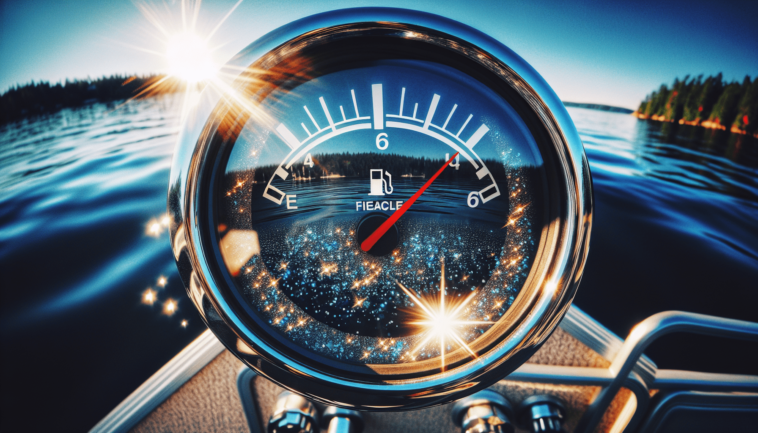If you’ve ever wondered if pontoon boats are fuel-efficient, you’re not alone. With their large size and spaciousness, it’s natural to question just how efficient these boats are when it comes to fuel consumption. In this article, we’ll take a closer look at the fuel efficiency of pontoon boats, exploring the factors that influence it and providing some insights to help you make an informed decision when choosing your next boating adventure. So, let’s set sail and find out if pontoon boats are indeed fuel-efficient!

Understanding Pontoon Boats
What are pontoon boats?
Pontoon boats are a popular type of recreational watercraft that offer a spacious and stable platform for various activities. These boats are characterized by their unique design, which includes two or three pontoons, or floats, that provide buoyancy and support. Pontoon boats are typically flat and wide, offering ample deck space for relaxing, fishing, and socializing. They have become increasingly popular among boaters of all ages, thanks to their versatility and comfort.
Design and structure
Pontoon boats have a distinct design that sets them apart from other types of watercraft. The foundation of a pontoon boat consists of one or more aluminum or steel pontoons that are attached to the boat’s deck. These pontoons create the buoyancy necessary for the boat to float and provide stability on the water. The deck of a pontoon boat is typically flat, allowing for easy movement and a variety of recreational activities.
Uses and popularity
Pontoon boats are favored for their versatility and are used for a wide range of activities. They are often seen at lakes and rivers, where they are enjoyed for fishing, cruising, watersports, and socializing with friends and family. The popularity of pontoon boats has soared in recent years due to their spaciousness, comfort, and the ability to accommodate larger groups of people. Their ease of use makes them appealing to boaters of all experience levels, from beginners to seasoned enthusiasts. Whether it’s a relaxing day on the water or an action-packed adventure, pontoon boats offer endless possibilities for fun and enjoyment.
Fuel Efficiency in Boats
Factors affecting fuel efficiency
Fuel efficiency is an important consideration for any boat owner, as it affects the cost of operating the vessel and the impact on the environment. Several factors can influence the fuel efficiency of a boat. These include the boat’s weight and size, the type and size of the engine, the operational speed, the load capacity, and the hull design.
Benefits of fuel-efficient boats
Owning a fuel-efficient boat has several advantages. Firstly, it reduces the amount of fuel consumed, resulting in cost savings over time. In addition, fuel-efficient boats have a reduced environmental impact, as they emit fewer greenhouse gases and decrease pollution in the waterways. Fuel-efficient boats also allow for longer cruising distances, which can enhance the overall boating experience.
Importance of fuel efficiency in pontoon boats
Fuel efficiency is particularly relevant for pontoon boat owners, as these boats are often used for leisurely cruises and extended periods on the water. With their spacious design and ability to carry larger groups of people, pontoon boats can consume more fuel compared to other types of watercraft. Therefore, selecting a fuel-efficient pontoon boat is essential to minimize operating costs and reduce the environmental footprint. Understanding the factors that affect fuel efficiency in pontoon boats is crucial when making a well-informed decision.
Fuel Consumption in Pontoon Boats
Engine types and sizes
The type and size of the engine can significantly impact the fuel consumption of a pontoon boat. Generally, smaller engines consume less fuel as they require less power to propel the boat. Two common types of engines used in pontoon boats are outboard motors and sterndrive engines. Outboard motors are typically more fuel-efficient, as they are lighter and produce less drag in the water. Additionally, newer models of engines tend to have improved fuel efficiency due to technological advancements.
Boat weight and size
The weight and size of a pontoon boat can influence its fuel consumption. Heavier boats require more power to propel through the water, resulting in increased fuel usage. Similarly, larger pontoon boats typically have larger engines, which can consume more fuel. When selecting a pontoon boat, it is important to consider the boat’s weight and size in relation to the desired fuel efficiency.
Operational speed
The speed at which a pontoon boat is operated can also impact fuel consumption. Higher speeds generally require more power and, subsequently, more fuel. Pontoon boats are known for their leisurely cruising speeds, which are typically more fuel-efficient compared to high-speed activities such as waterskiing or wakeboarding. Maintaining a moderate speed can help maximize fuel efficiency and optimize the overall boating experience.
Load capacity
The number of people and amount of gear on board a pontoon boat can affect fuel consumption. Carrying a heavier load increases the boat’s weight and requires more power to move through the water. Therefore, taking into account the load capacity when planning a trip can help optimize fuel efficiency. It is important to ensure that the weight onboard adheres to the manufacturer’s guidelines and does not exceed the recommended limits.
Hull design and drag
The design of a pontoon boat’s hull can impact its fuel efficiency. Pontoon boats with a tri-toon design, consisting of three pontoons instead of two, tend to have better fuel efficiency due to reduced drag in the water. Additionally, hulls with an optimized shape and streamlined design can minimize resistance and improve fuel efficiency. When considering a pontoon boat, it is worth exploring different hull designs and their impact on fuel consumption.
Measuring Fuel Efficiency
Miles per Gallon (MPG)
Miles per Gallon (MPG) is a common measurement used to quantify fuel efficiency in boats. It represents the distance traveled for each gallon of fuel consumed. A higher MPG indicates better fuel efficiency, as the boat can travel a greater distance on less fuel. Calculating the MPG of a pontoon boat involves dividing the distance traveled by the amount of fuel consumed during that time.
Gallons per Hour (GPH)
Gallons per Hour (GPH) is another metric used to measure fuel consumption in boats. Unlike MPG, GPH focuses on the rate at which fuel is consumed. This measurement is particularly useful when considering the operational costs and budgeting for fuel expenses. It helps boat owners estimate how much fuel will be consumed per hour of operation and plan accordingly.
Comparing fuel consumption
Comparing fuel consumption between different pontoon boat models can be helpful when determining the most fuel-efficient option. By researching and reviewing the manufacturer’s specifications, prospective buyers can assess the fuel consumption rates of various boats. Additionally, speaking with current owners and reading testimonials can provide first-hand insights into the fuel efficiency of specific pontoon boat models in real-world scenarios.

Determining Factors for Pontoon Boats
Horsepower and engine efficiency
The horsepower of the engine plays a significant role in a pontoon boat’s fuel efficiency. More powerful engines generally consume more fuel, while smaller engines with lower horsepower tend to be more fuel-efficient. Besides horsepower, engine efficiency is also crucial in determining fuel consumption. Newer engines often have improved efficiency, resulting in better fuel economy.
Trim and tilt mechanisms
Trim and tilt mechanisms, which allow for adjustments to the angle of the outboard motor or sterndrive, can affect fuel efficiency. Properly trimmed and tilted engines can optimize the boat’s performance by reducing drag, improving fuel economy, and enhancing overall handling. Understanding how to use these mechanisms correctly and making adjustments based on the operating conditions can significantly impact fuel efficiency.
Fuel management systems
The implementation of fuel management systems can enhance fuel efficiency in pontoon boats. These systems optimize fuel consumption by monitoring and adjusting various parameters such as engine performance, fuel mixture, and throttle response. Some modern pontoon boats may be equipped with advanced fuel management systems that automatically optimize fuel efficiency, making boating more economical and eco-friendly.
Improving Fuel Efficiency
Regular maintenance and tuning
Regular maintenance and tuning are crucial for ensuring optimal fuel efficiency in pontoon boats. This includes routine engine maintenance, such as changing the oil and filters, inspecting the spark plugs, and ensuring proper fuel system functioning. Regularly checking and adjusting the engine’s performance parameters can help maintain peak fuel efficiency and prevent any issues that may diminish fuel economy.
Propeller selection and maintenance
The selection and maintenance of the propeller on a pontoon boat can significantly impact fuel efficiency. A properly matched propeller ensures efficient power transfer and reduces strain on the engine, resulting in better fuel economy. Regularly inspecting and maintaining the propeller, such as removing any debris or dents, can also help optimize fuel efficiency.
Trimming the boat
Properly trimming the boat helps optimize performance and fuel efficiency. Adjusting the boat’s trim allows it to maintain a level attitude on the water, reducing drag and improving fuel economy. Understanding how to trim a pontoon boat and making adjustments based on the load, speed, and water conditions can contribute to better fuel efficiency.
Reducing weight and distribution
Reducing excess weight and properly distributing the load on a pontoon boat can enhance fuel efficiency. Unnecessary weight can increase fuel consumption, as the engine needs to work harder to move the boat through the water. Ensuring that the boat is not overloaded and distributing the weight evenly across the pontoons can help maintain optimal fuel efficiency.
Eco-friendly Alternatives
Electric or solar-powered engines
Electric and solar-powered engines offer an environmentally friendly alternative for pontoon boat owners. These clean energy options eliminate the need for traditional fossil fuels, resulting in zero emissions and reduced pollution. Electric and solar-powered pontoons provide a quieter and smoother boating experience, while also reducing the dependency on traditional fuel sources.
Hybrid pontoon boat systems
Hybrid pontoon boat systems combine traditional combustion engines with electric propulsion systems, offering the best of both worlds. These systems utilize the combustion engine for higher power demands and long-range cruising, while the electric motor operates at lower speeds and for shorter distances. By incorporating electric power, hybrid systems enhance fuel efficiency and reduce environmental impact.
Real-world Examples
Fuel-efficient pontoon boat models
Several pontoon boat manufacturers offer fuel-efficient models designed to maximize performance and decrease fuel consumption. These models incorporate optimized hull designs, efficient engines, and advanced fuel management systems to achieve better fuel efficiency. Researching and comparing these models can help prospective buyers make informed choices based on their specific needs and priorities.
Owner experiences and testimonials
Learning from the experiences of current pontoon boat owners can provide valuable insights into real-world fuel efficiency. Owners can provide firsthand accounts of their boats’ performance, fuel consumption rates, and any modifications or maintenance practices that have improved fuel efficiency. Reading testimonials and participating in boating forums can help equip potential buyers with knowledge and perspectives that contribute to an informed decision.
Cost and Budget Considerations
Initial purchase costs
Pontoon boats are available at a wide range of price points, depending on factors such as size, brand, and features. Fuel-efficient pontoon boats may have a higher initial purchase cost, as they often incorporate advanced technologies and materials. However, considering the long-term fuel savings and potential environmental benefits, the investment in a fuel-efficient pontoon boat can prove to be cost-effective over time.
Operating costs and maintenance
Operating costs and maintenance expenses should be factored into the budget when owning a pontoon boat. Fuel consumption is a significant component of operating costs, and opting for a fuel-efficient boat can help minimize expenses in this area. Regular maintenance, including engine tune-ups, propeller maintenance, and hull cleaning, is also necessary for ensuring optimal fuel efficiency. In addition, other costs such as insurance, mooring fees, and winter storage should be considered when planning a budget for owning a pontoon boat.
Return on investment
While fuel efficiency is important in terms of cost savings and environmental impact, it is also essential to consider the overall return on investment (ROI) when purchasing a pontoon boat. A fuel-efficient boat can offer better resale value, as prospective buyers are more likely to be attracted to boats with lower operating costs and minimal environmental impact. Therefore, selecting a fuel-efficient pontoon boat can have long-term financial benefits and contribute to a positive ownership experience.
Conclusion
The overall fuel efficiency of pontoon boats can vary depending on various factors such as engine type and size, boat weight and size, operational speed, and load capacity. Understanding the determinants of fuel efficiency and the potential for improvement is essential for making informed decisions when purchasing or owning a pontoon boat. By considering factors such as engine horsepower, trim and tilt mechanisms, and fuel management systems, boat owners can maximize fuel efficiency and optimize their boating experience. Eco-friendly alternatives such as electric or hybrid systems also provide environmentally conscious options for pontoon boat owners. Additionally, considering the cost and budget implications, including the initial purchase cost, operating costs, and potential return on investment, can further guide boaters in selecting the right pontoon boat that meets their needs and priorities. Ultimately, by taking into account these factors and understanding the benefits and importance of fuel efficiency, boaters can enjoy their pontoon boats while minimizing the impact on the environment and their wallets.





